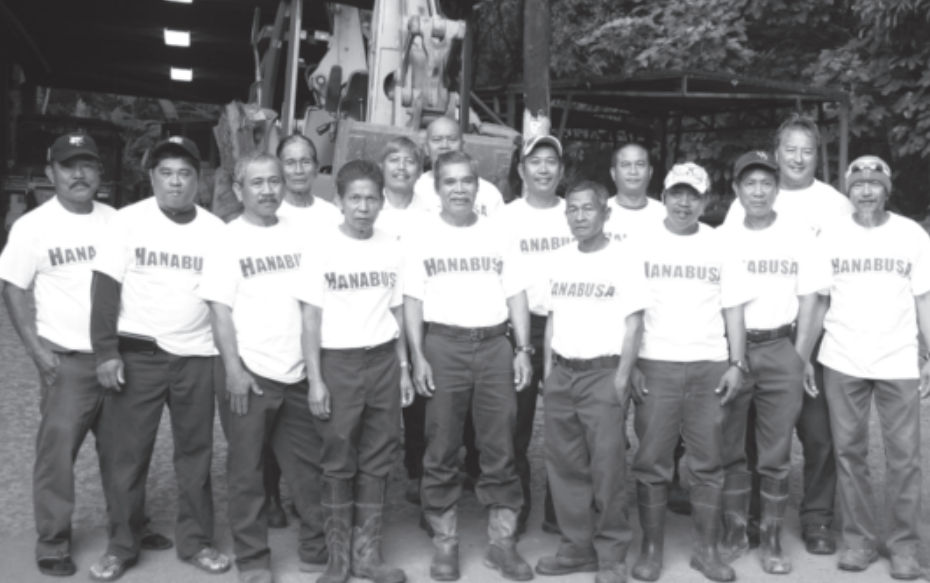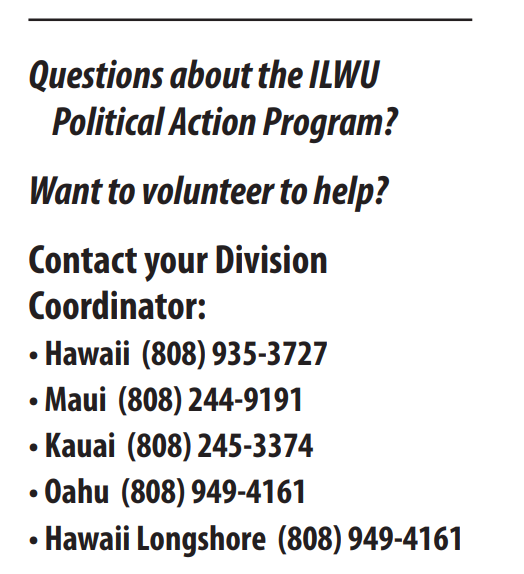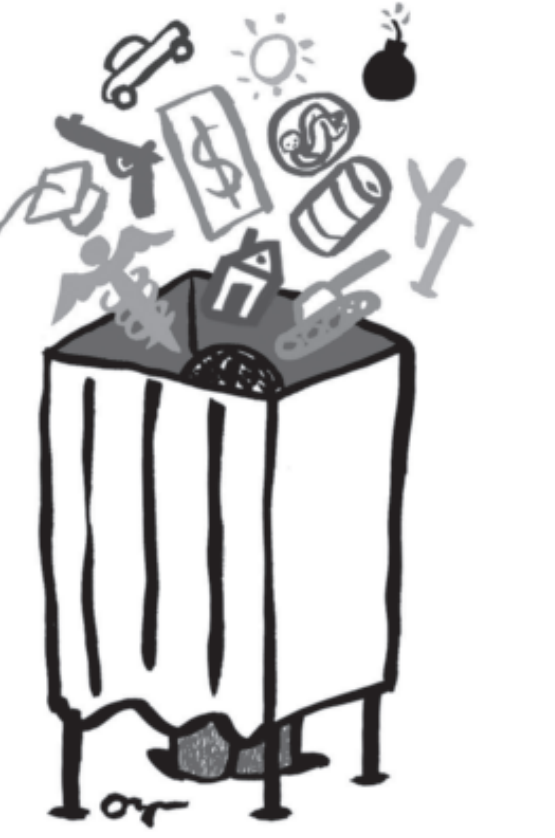From the very beginning, the ILWU has always proclaimed that the union and every union member must be actively involved in the political life of the community. Political action had to be one of the primary activities of the union. Political action was just as important as negotiating contracts for better wages and benefits; and political action was just as necessary as organizing new workers into the union. There are five reasons why the union and every ILWU member must be involved in political action.
1.Laws can be made that take away our rights.
1When the ILWU began organizing in Hawaii, a handful of wealthy families owned the sugar and pineapple plantations and the largest companies. Individuals from these families, their attorneys, or the managers and supervisors of their companies ran for elected office as Republicans. Workers were expected to vote for Republicans and could lose their jobs if they voiced any objections or supported Democrats. In this way, big business and their wealthy owners controlled the legislature and government. They used the government and passed laws to preserve their wealth and prevent workers from organizing unions. They passed an Unlawful Assembly and Riot Act which was used to stop union meetings. Union leaders could be arrested for conspiracy and encouraging riots. It was illegal for workers to picket a business because it interfered with commerce and threatened profits of the business owner. The police, the national guard, and the courts were used to control workers. The University was primarily an agricultural school that trained graduates to work for the plantations.
When workers are not involved in political action, they risk losing their rights.
2. Laws can provide benefits and extend our rights.
At the same time the ILWU was organizing sugar and pineapple workers, the union worked to elect candidates who were not connected to big business and supported a more just and democratic society. Most of these candidates identified with the Democratic Party.
In 1944, union supported candidates won 24 seats in the Territorial Legislature. In 1946, union political action elected 35 legislators and a majority in the lower house. Those elected included a number of union members who were encouraged to run for office. The Democratic majority in the legislature repealed many of the anti-labor laws and passed a law that gave agricultural workers the right to unionize. In 1954, Democrats won 55 of 76 elections, giving them a majority in the house and senate.
The plantations ran their own clinics and housing, but the population was growing and the plantations were mechanizing and cutting their workforce. The Democrats and unions shared many of the same political goals—they believed government had to change to provide the services needed by the ordinary working people of Hawaii. They built public schools, community colleges, and expanded the education programs of the University of Hawaii. They built public hospitals to take the place of the private plantation clinics. They built parks, public housing, and started programs for the elderly. They changed the tax system to equalize the burden where people with higher incomes paid higher taxes.
The Democrats, with the support of the labor movement, passed laws to give public workers the right to collective bargaining, increase the minimum wage, provide unemployment insurance, improve Workers Compensation for injured workers, require job safety, protect the environment, manage economic development, and preserve agricultural land and water resources.
Union members must be involved in political action to protect these hard-won gains and rights.

Members of Unit 4415 Valley of the Temples Memorial Park showing their support for Colleen Hanabusa. (front row (l-r)): Jose Sarmiento, Tomas Estalila Jr., Bonifacio Agapay, Unit Chairman Francis Agustin, Jimmy Delos Santos, Pedro Sarmiento, Gabriel Agustin, Prudencio Bautista and Goldwin Nastor. (back row (l-r)): Eugenio Pagdilao, Gabriel Bumanglag, Troysen Garcia, Ferdinand Calaycay, Jimmy Talana Tajon and Vann Kamakaala.


3. Our government has grown to serve many of the needs of working families.
Many working families are misled to believe government is bad, politicians are crooks, and taxes are too high. These ideas come from negative and deceptive propaganda put out by groups who oppose many of the goals of working families.
In reality, working people receive a lot from government. We depend on government to run our schools, take care of the health and welfare of the community, provide for public safety and emergencies, and maintain our highways, harbors, and airports. These government functions account for 85 percent of the state’s expenses.
Workers depend on government to safeguard and promote the longterm well-being of the community. This is why government regulates businesses to protect the public from contaminated and harmful products, prohibit price-fixing and deceptive business practices, require job safety, and prevent mistreatment of workers. Government regulation could have prevented the financial crisis caused by the reckless conduct of mortgage companies and banks.
Republicans oppose this expanded role of government. They want to cut public services which serve the needs of working families and they want to eliminate taxes and regulation of business. Republicans try to turn the public against government by using loaded, negative words such as “big” government, “corrupt” politicians, tax “burden”, “waste”, and “bureaucracy”. These loaded words are repeated by the media, and many voters are misled about the essential role and function of government.
Union members must educate their co-workers to support their union’s political action program and maintain needed government services to working families.
4. The political process, like negotiations, requires making laws acceptable to the majority.
Even if every union member and their family voted for labor supported candidates, there would not be enough votes to pass good labor laws. Union members must also volunteer to help endorsed candidates win their elections in other districts.
Hawaii’s labor movement has never had a strong majority of support in the legislature. Unions have to work together with likeminded groups and legislators to gain enough support to make laws. Sometimes compromises have to be made. While the final laws are not everything labor wants, real gains are made which lays the foundation for future improvements.
There are many districts where most of the voters are not union members. Some of these legislators vote to support labor programs because they come from a working class background and believe in the same principles. In other cases, the union must work hard to educate and persuade legislators on the issues important to workers.
The union will endorse and support candidates based on their record of working with the union on labor issues. Most of the endorsed candidates are on Oahu, and many more ILWU members on Oahu are needed to help elect legislators in other districts.
Union members are needed to go house-tohouse, talk to voters, make phone calls, and wave signs.
Union members increase their union’s bargaining power to pass good laws by helping union endorsed candidates in other districts.

5. ILWU Local 142 union political action continues year round.
Many people think their vote does not count for much and political action ends after the election. This is true when people act as individuals. When union members get involved and support their union’s political action program, this focuses and multiples their power as working people.
The union works throughout the year to promote programs that benefit working families at all levels of government. The union watches bills that are proposed by the State Legislature, County Councils, and US Congress.
The union works to build support for good bills and defeat bad bills. This involves educating legislators on the issues and gaining their support. It involves having union members testify at public hearings or organizing members to phone and write letters to their elected representatives. It involves working together with other unions, churches, and community organizations to pass good bills.
Every ILWU unit should have a political action committee to educate members and recruit volunteers to help elect union endorsed candidates.

